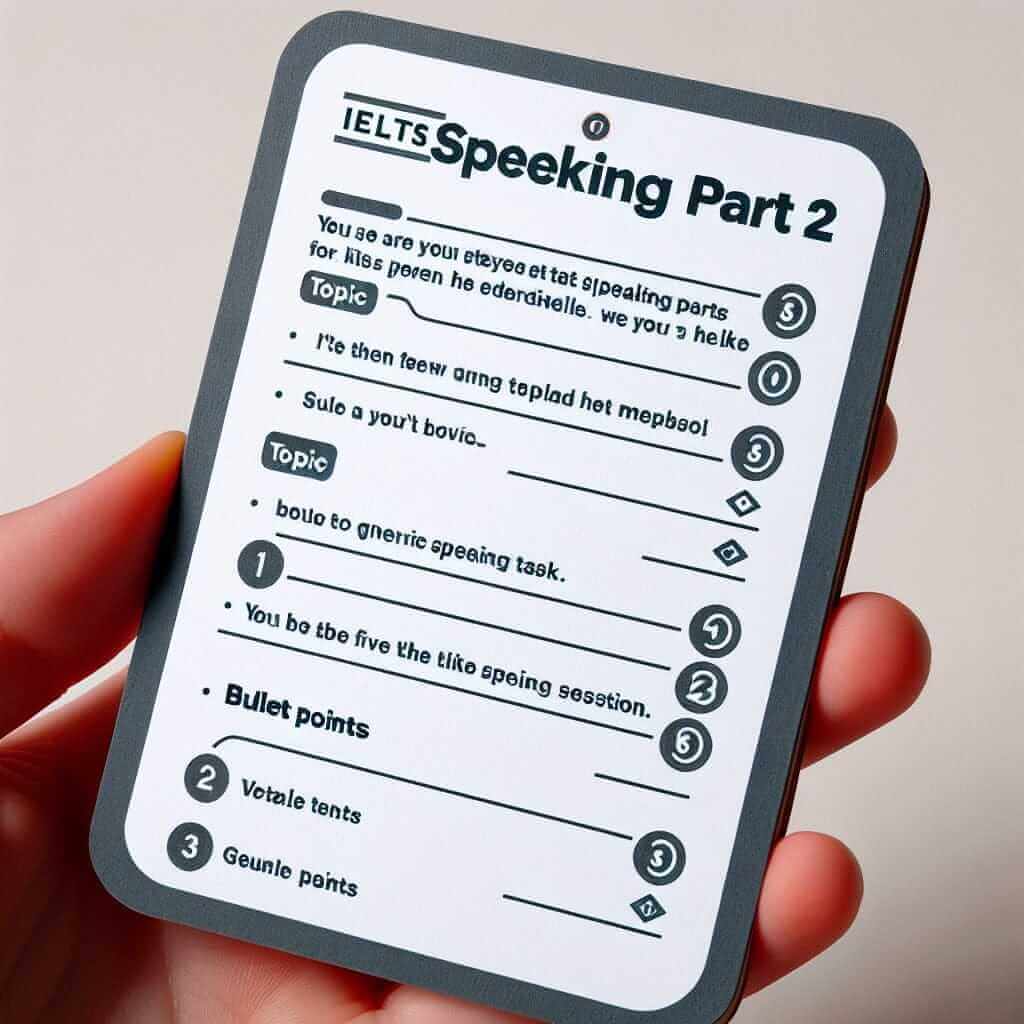The IELTS Speaking Part 2, also known as the “Long Turn”, can often feel like the most daunting section of the Speaking test. You’re expected to speak solo for 1-2 minutes on a given topic, which can feel like an eternity if you’re unprepared! But fear not, aspiring high-scorers. With a solid understanding of the task, targeted practice, and some insider tips, you can deliver amazing Part 2 responses that will impress the examiner.
Understanding IELTS Speaking Part 2
This section evaluates your ability to speak fluently and coherently on a specific topic for an extended period. You will be given a cue card with a topic, some prompts, and one minute to prepare your thoughts. Then, you’ll be asked to speak for 1-2 minutes. The examiner will not interrupt you during this time and will ask one or two follow-up questions at the end.
Crafting Your Amazing Part 2 Response
Here’s a breakdown of how to approach this section strategically:
1. Analyze the Cue Card
Don’t rush into making notes. Take a moment to fully understand what the cue card asks. Identify the keywords related to the topic and pay close attention to the prompts provided. These prompts are your guideposts; ensure your response addresses each one directly or indirectly.
2. Plan Your Response Strategically
That one minute of preparation time is precious. Instead of frantically trying to write a full speech (which is a big no-no!), use it to jot down key ideas and vocabulary related to each prompt. Think of it as creating a mental roadmap for your response.
3. Deliver a Well-Structured Response
A structured response is key to demonstrating coherence. Aim for a clear beginning, middle, and end.
- Introduction: Start strong by paraphrasing the topic and setting the context for your response. This shows the examiner you understand the task and can use your own language.
- Body Paragraphs: Devote each prompt on the cue card to a separate part of your response. Use your notes to develop each point with relevant details, examples, and anecdotes.
- Conclusion: Summarise your main points briefly and offer a concluding thought or feeling.
4. Employ Effective Language
The way you express yourself is just as important as what you say. Here are some language elements to focus on:
- Vocabulary: Showcase a wide range of vocabulary relevant to the topic. Avoid repetition by using synonyms and paraphrasing.
- Grammar: Accuracy is important, but don’t be afraid to use complex grammatical structures if you can do so confidently.
- Connectors: Use a variety of linking words and phrases (e.g., furthermore, however, in contrast) to ensure your ideas flow smoothly and logically.
- Fluency and Pronunciation: Speak at a natural pace. It’s okay to pause briefly to gather your thoughts. Focus on clear pronunciation and intonation to enhance your message.

Example Response
Let’s put this into practice. Imagine you receive the following cue card:
Describe a time you received good news.
- What the good news was
- When and where you received it
- Who you were with
- And explain how you felt when you received this good news.
Here’s a sample response:
“I’m going to tell you about the time I received the news that I had been accepted into my dream university. It was late afternoon, and I was at home anxiously refreshing my email inbox every few minutes. My family was out, so I had the house to myself. Suddenly, an email popped up from the university admissions office. My heart skipped a beat as I clicked it open.
Right there, in black and white, were the words “Congratulations! We are delighted to offer you a place in our program.” I couldn’t believe my eyes! I must have read that sentence ten times before it finally sank in. I was overwhelmed with joy and relief. All those months of hard work and preparation had paid off. I immediately called my parents, who were just as ecstatic as I was. We celebrated with a huge dinner that night, and I remember feeling incredibly grateful and excited about the future.”
Top Tips for Part 2 Success
- Practice makes perfect: The more you practice speaking on different topics, the more confident you will become.
- Record yourself: This helps identify areas for improvement in your fluency, vocabulary, and grammar.
- Think outside the box: Don’t limit yourself to personal anecdotes. Use your imagination to create interesting narratives, even if they’re not entirely based on your own experiences.
- Don’t memorize answers: Examiners can easily spot memorized responses. Focus on developing the skills to speak spontaneously on a variety of topics.
- Relax and be yourself: Speak naturally and enthusiastically. Your personality should shine through!
Conclusion
Mastering IELTS Speaking Part 2 is entirely achievable with focused effort and the right approach. Remember to analyze the cue card carefully, plan strategically, structure your response coherently, use effective language, and practice regularly. Go into your exam feeling confident and prepared to demonstrate your amazing speaking abilities!